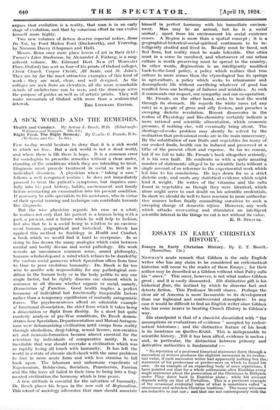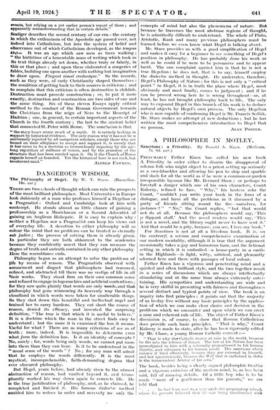ESSAYS IN EARLY CHRISTIAN HISTORY.
Essays In Early Christian History. By E. T. Merrill.. (Macmillan. 15s.)
NEWMAN'S acute remark that Gibbon is the only English' writer who has any claim to be considered an ecclesiastical, historian will occur to the reader of these Essays ; for their author may be described as a Gibbon without what Paley calls his " sneer." This sneer, however, is not what makes Gibbon great ; and it is easily discounted. His distinctive gift is his historical flair, the instinct by which he discerns fact and detects fiction. This Professor Merrill shares. Perhaps the clear air of America is more favourable to its development than our fogbound and Controversial atmosphere. In any case it would be difficult to find an English writer since Gibbon who has come nearer to treating Church History in Gibbon's way.
His standpoint is that of a classicist dissatisfied with " the assumptions or evaluations of evidence " accepted by ecclesi- astical historians ; and the distinctive feature of his book is its insistence on Quellen-ICritik. This is indispensable to scientific history. _Till it has been sifted, evidence is useless ; and, in particular, the distinction between primary and • derivative authorities is fundamental :- " No repetition of a professed historical statement down through a succession of writers produces the slightest increment in its eviden- tial value, if each successive writer had apparently nothing but the,' statement of his predecessor or predecessors on which to found his own. As an example of an expanding body of mere repetitions, I have pointed out that for a whole millennium after Eusebius every single statement about the persecution of the Christians in Bithynia under Pliny dates back to Eusebius alone ; while his account depends solely on that of Tertullian. This is a pertinent example of the occasional evidential value of what is sometimes called a unanimous and unbroken Christian tradition.' The many witnesses are reducible to just one ; and that one not contemporary with-the
events, but relying on a yet earlier person's report of them ; and apparently misunderstanding that in certain details."
Sealiger describes the second century of our era—the. century in which the enthusiasm of the Apostolic age passed over, not indeed into Catholicism, but into the system of belief and observance out of which Catholicism developed, as the temp us advX0r. It was an age which saw men as trees walking ;
" the birthtime of a lamentable mass of writing which took as its text things already set down, whether truly or falsely, in this or that place ; and upon these elaborated a congeries of fables, building one upon another with nothing but imagination
to draw upon. Fingunt simul creduntque." So the records, such as they were, of early Christianity shaped themselves : the condition of getting back to their sources is criticism ; and to complain that this criticism is often destructive is childish.
Destruction must precede construction ; or, to put it more exactly, destruction and construction are two sides of one and the same thing. Six of these eleven Essays apply critical method to the conduct of the Roman Government towards the Christians from the reign of Nero to the Rescript of Hadrian ; one, in general, to certain important aspects of the Church in the fourth century ; the last to the ancient belief that connected St. Peter with Rome. The conclusion is that
" the story bxsrs every mIrk of a myth. It is entirely lacking in support by historical evidence. The only reason why it has not be n universally rejected by all competent scholars, except those who are bound on their allegiance to accept and support it, is merely that it has come to be a doctrine se tremendously imposing by the age- long repetition of millions of voices, and by the grandeur of the Structure that has been erected upon it. On it the Church of Rome regards herself as founded. Yet the historical base is not rock, but



































 Previous page
Previous page